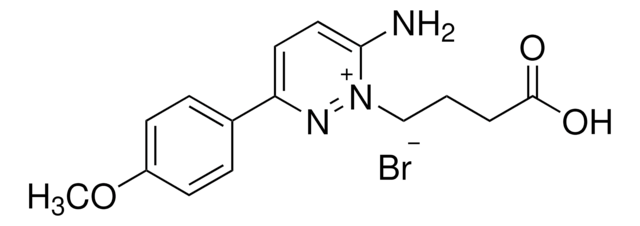G002
Isoguvacine hydrochloride
solid
Synonyme(s) :
1,2,3,6-Tetrahydro-4-pyridinecarboxylic acid hydrochloride
About This Item
Produits recommandés
Forme
solid
Niveau de qualité
Couleur
white
Solubilité
H2O: soluble (refrigerate if not used immediately.)
methanol: slightly soluble
neutral and acidic solutions: stable (in basic solutions the free amine can oxidize easily)
Chaîne SMILES
Cl[H].OC(=O)C1=CCNCC1
InChI
1S/C6H9NO2.ClH/c8-6(9)5-1-3-7-4-2-5;/h1,7H,2-4H2,(H,8,9);1H
Clé InChI
SUWREQRNTXCCBL-UHFFFAOYSA-N
Informations sur le gène
human ... GABRA1(2554) , GABRA2(2555) , GABRA3(2556) , GABRA4(2557) , GABRA5(2558) , GABRA6(2559) , GABRB1(2560) , GABRB2(2561) , GABRB3(2562)
Application
- to study its effects on neuronal activity in rats
- to study its antiallodynic effect in rats
- to study its effects on baroreflex gains in rats
Actions biochimiques/physiologiques
Caractéristiques et avantages
Mention d'avertissement
Warning
Mentions de danger
Conseils de prudence
Classification des risques
Eye Irrit. 2 - Skin Irrit. 2 - STOT SE 3
Organes cibles
Respiratory system
Code de la classe de stockage
11 - Combustible Solids
Classe de danger pour l'eau (WGK)
WGK 3
Équipement de protection individuelle
dust mask type N95 (US), Eyeshields, Gloves
Certificats d'analyse (COA)
Recherchez un Certificats d'analyse (COA) en saisissant le numéro de lot du produit. Les numéros de lot figurent sur l'étiquette du produit après les mots "Lot" ou "Batch".
Déjà en possession de ce produit ?
Retrouvez la documentation relative aux produits que vous avez récemment achetés dans la Bibliothèque de documents.
Les clients ont également consulté
Articles
DISCOVER Bioactive Small Molecules for Neuroscience
DISCOVER Bioactive Small Molecules for Neuroscience
DISCOVER Bioactive Small Molecules for Neuroscience
DISCOVER Bioactive Small Molecules for Neuroscience
Notre équipe de scientifiques dispose d'une expérience dans tous les secteurs de la recherche, notamment en sciences de la vie, science des matériaux, synthèse chimique, chromatographie, analyse et dans de nombreux autres domaines..
Contacter notre Service technique











